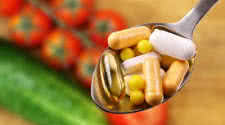How do Supplements Work - How They Can Help Your Body

Understanding Which Supplements Work is the Key
I recently returned from a nutrition conference in Chicago, where the expert consensus appeared to be that you should get all your nutrients only from food. The scientific experts spoke of possible
toxicity from overzealous food supplementation and advised that most people should follow the USDA's food-pyramid guidelines that replaced the four food groups several years ago. The main difference
between the two is that the pyramid focuses on foods lower in fat, such as fruits and vegetables.
While this is generally good advice, in the real world, few people follow a perfectly balanced diet. This is where food supplements enter the picture. Supplements are just that: nutrients to fill in
the missing pieces of a diet. As long as they are kept in that perspective, supplements can be extremely useful.
For example, let's say you are a skinny teenager trying to gain weight. If you have a rapid metabolism coupled with a poor appetite, force-feeding just won't work. A far more efficient method would
be eating regular meals supplemented with a high-quality weight-gain supplement. While the original weight-gain powders from years past consisted of mostly sugar and nonfat milk powder, newer versions
contain superior protein sources, such as whey or eggs, combined with a full complement of other nutrients. In short, they qualify as genuine meals.
As for the best supplement for a teenager or anyone else: There is no such animal. The best supplement depends on your goals. Obviously, if you're trying to lose weight, you wouldn't want to use a
weight-gain powder. In addition, I know of no particular food supplement designed exclusively for teenagers or any other age group. Conversely, I also can't think of any food supplement that's
contraindicated for teenagers.
Critics of weight-gain supplements often exhort that the only mass you'll gain from these sources is fat mass. But this claim must be qualified. People with higher metabolisms have little to worry about
because the calories in good weight-gain powders derive from complex carbohydrates and protein. Only small amounts of fat are included, and some newer versions are fat-free. This is significant because
dietary fat calories are most associated with increased bodyfat deposition. Active people, including bodybuilders, are unlikely to get fat from carbohydrates or protein.
Still, it's best to properly space your intake of weight-gain powders. Forget the suggested advice to consume 1,000 or more calories in one drink. In such cases, you may overload your body's capacity to
properly metabolize such an abundant caloric intake, shifting the calories into the fat pathway. It is much better to consume your usual three or more food meals and supplement these with good weight-gain
drinks between meals two or three times a day. Your goal should be to consume either food or supplements every 2-3 hours. This allows the most efficient use of calories, thus preventing caloric spillover
into fat.
Losing fat requires a different approach. You must take in fewer calories than you burn through activity, such as exercise. A reduction in calories means less food, which in turn leads to decreased
nutrient intake. This is a situation where taking food supplements can offer true advantages. For one, supplements provide nutrients without excess calories, thus ensuring adequate nutrition without
compromising your dieting efforts.
Most athletes on diets are often deficient in nutrients such as calcium because calcium-rich dairy foods are often eliminated. A simple solution is to take a multimineral supplement containing calcium
and co-factors needed for full assimilation, such as magnesium and vitamin D. High-quality protein supplements such as those derived from whey or dairy products can provide the essential amino acids
needed for both muscle-protein synthesis and prevention of muscle catabolism (breakdown) caused by a limited caloric intake.
Mainstream nutrition authorities often decry the use of protein supplements, claiming that most people get more than enough simply by consuming protein foods, such as meat, fish and eggs. But such foods
also contain undesirable elements, such as fat. In other cases, some people (myself included) find foods such as fish unpalatable.
One caveat, however, involved in food-supplement use is to be aware of extravagant claims. For example, I recently saw a mailer that claimed that a certain supplement could pack on 15 pounds of muscle
in two weeks. Such rapid muscle gains are unheard of; even anabolic steroids aren't capable of promoting gains like that.
No food supplement, contrary to what you may have read, equals the potency of drugs. Drugs generally work by altering body chemistry, such as enzyme systems in the case of steroids. Supplements work by
increasing body-nutrient efficiency; they work with the body, not by altering natural functions. The downside is that any gains fostered by food supplements are far more subtle than drug-induced gains.
But supplement gains are also more permanent, unlike the often transient gains resulting from using drugs.
Be patient, use supplements wisely and don't expect overnight miraculous muscle gains.